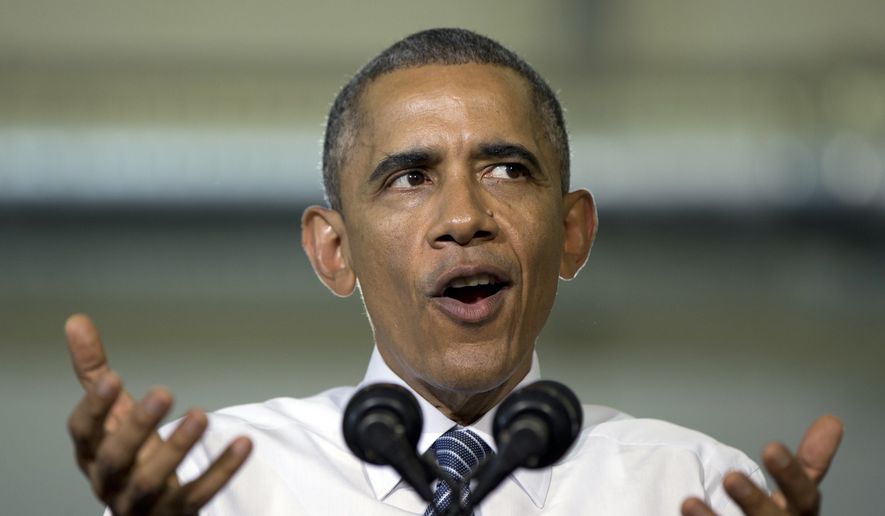On Wednesday, the White House reached out on social media, asking for questions and comments concerning the best way forward for America.
Until now, Barack Obama simply has dismissed inconvenient facts, preferring instead to inhabit an alternate reality. This would be funny were it not downright dangerous.
Happy talk notwithstanding, official estimates published under the Obama administration’s watch demonstrate that the U.S. economy still operates in the danger zone. Meanwhile, foreign enemies and rising rivals continue to advance, threatening all Americans and our dwindling number of resolute allies.
With so many disappointments, so many setbacks and so many scandals since January 2009, why do supposedly sensible “folks” accept the Obama administration storyline of success that is belied by evident facts and common sense?
America’s private sector is hardly doing fine
To see for yourself whether we are making true progress, you must concentrate upon meaningful signals and pick a reasonable time frame. If you do these two things, you have hope of gaining proper perspective.
One trend to examine is the trajectory of private sector jobs over time.
From 1981 through 1999, the number of private sector jobs (adjusted to normalize less-remunerative part-time jobs with more secure full-time jobs) increased from 71.9 million to 101.9 million, an average gain of 1.7 million jobs per year.
In the new millennium, private sector jobs (calculated the same way on a “full-time equivalent” basis) increased to 108.9 million by 2007, an average gain of less than 1 million per year.
Between 2007 and 2013 (the last full year for which comparable data is available), the number of full-time equivalent jobs in the private sector declined by 2.0 million in total over six years — from 108.9 million to 106.9 million.
To get back on trend 1981 to 1999, private sector jobs should have reached 125.3 million in 2013, instead of 106.9 million. Following the 1981 to 2007 trajectory, private sector jobs should have been 117.5 million. Returning to the slow growth course seen from 1999 to 2007, the private sector job count should have been 114.2 million.
There is no responsible reason to crow now about restoring economic success in the core private sector.
Addiction to debt further constrains America’s options
Most of us do not remember how painful it becomes to service debt when borrowing rates rise and lending institutions tighten credit standards. Generally speaking, American households, businesses, financial institutions and government entities have found it easy and relatively inexpensive to borrow gargantuan sums from 1981 onwards.
A simple way to see the danger now posed by our embedded propensity to borrow is to look at the relationship between total borrowings and private sector wages in key years.
In 1981, when U.S. dollar interest rates reached historic highs, our total debt was $5.3 trillion, or 4.3 times the $1.2 trillion in wages earned by all private sector workers.
By 1999, total debt reached $25.4 trillion, or 6.8 times private sector wages that totaled $3.7 trillion.
In 2007, just before the “bubble” burst, total debt soared to $50.1 trillion, a staggering sum that was 9.4 times private sector wages of $5.3 trillion.
For all the “success” talk you heard Tuesday night regarding the State of the Union address, America’s total debt climbed in 2013 to $56.7 trillion, or 9.6 times private sector wages of $5.9 trillion.
America’s finances still are stretched thin and we continue running sizable annual government deficits, so our realistic options to defeat rising threats inside and outside our borders remain constrained.
Mr. Obama’s inexplicable and dangerous entanglements
Surprising voices — for example Thomas Friedman of The New York Times — are speaking up with valid criticism over Mr. Obama’s foreign policies.
America will never defeat an enemy — radical Islamic jihad — we cannot even name.
Yemen, a nation Mr. Obama cited as a success story last September, descends into chaos, while the local branch of al Qaeda there trumpets plans for imminent attacks against us.
Iran extends influence in numerous places and leaders openly brag about progress made at American expense, while threatening our allies, and hurling irresponsible accusations toward the West.
Moreover, Iran and Russia move ever closer, cooperating in ways that could negatively affect Western interests many places.
Why does it make any sense to create a power vacuum in the Middle East that Iran and Russia will try to fill? And what, exactly, is our end-game with Russia?
Mr. Obama is selling a vision he cannot ground in verifiable reality.
Tell President Obama what you really think about the State of the Union on Twitter at #AskTheWH.




Please read our comment policy before commenting.